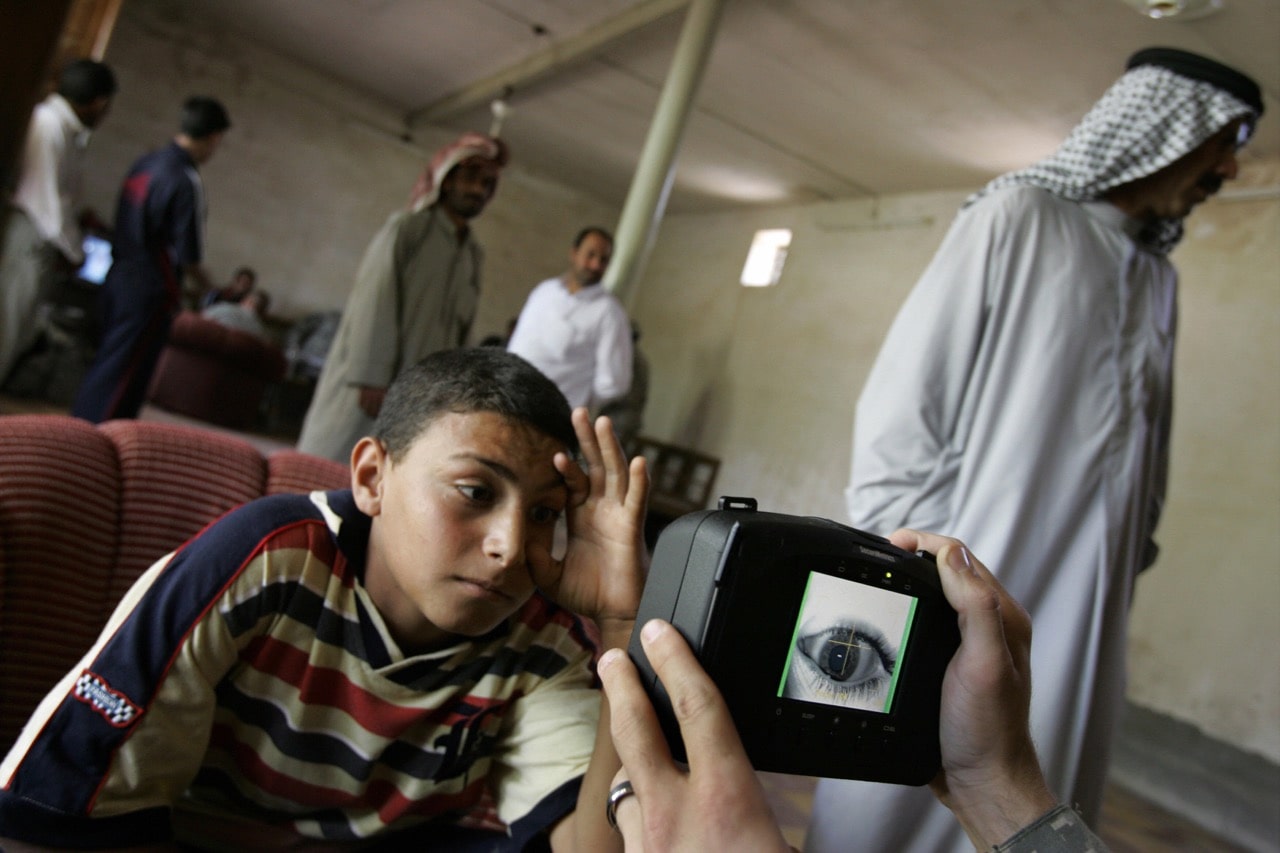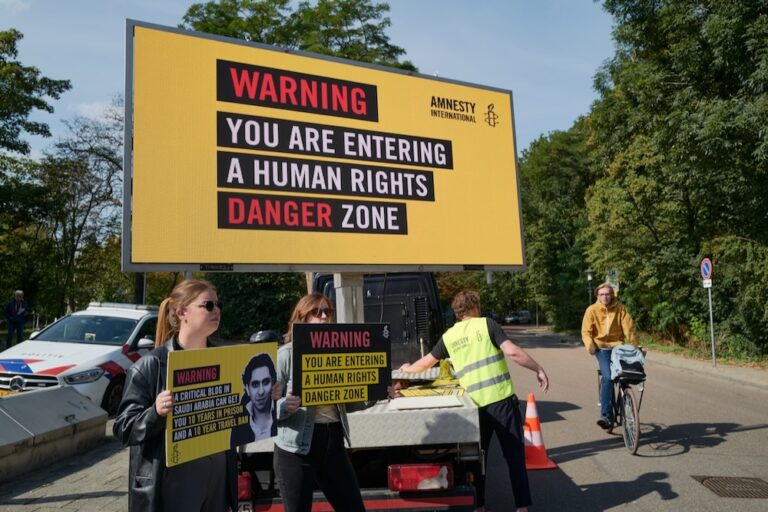SMEX interviewed 15 MENA journalists and civil society researchers to discuss challenges and opportunities of covering digital rights.
This statement was originally published on smex.org on 23 August 2018.
Introduction
One day in early 2015, Habib Battah, an investigative journalist who operates the website Beirut Report, noticed new construction works in the city’s Hamra district. Hoping that this was the physical manifestation of much-touted plans to upgrade the notoriously slow internet in Lebanon, he observed thin blue pipe being laid into newly dug trenches, and “mystery boxes” popping up all over the neighborhood. Initially, he asked himself “Does that mean there are hard drives in there and thus…internet??” but the hope was short-lived. Soon afterward, near one of the trenches, he saw a sign for Guardia Systems, a security company known for installing surveillance systems and providing security for ABC, a local shopping mall franchise in Beirut. “So maybe the blue pipes are not water, electricity or internet – maybe they are just security camera feeds?” he deduced. A little more research confirmed his hypothesis, and he documented both the installation of metal poles “studded with cameras” and found a news story about Guardia winning a $36 million contract to install more than 1,850 cameras to monitor the street-level activity in a project called Beirut City Surveillance.
In the course of his investigation, Battah had talked to workmen, taxi drivers, and ministry advisors, yet he could not get a clear answer about the purpose of these cables and boxes. He consulted the websites of government agencies, the Beirut municipality, and Guardia Systems, but they also yielded no answers. The only information he could find in the local news concerned the contract with Guardia and assertions that it had been illegally awarded. “I don’t even remember this coming up,” he wrote in the post, “let alone the ethical debates about surveilling the entire Ras Beirut population.” Three years later, SMEX dug deeper to answer several of the questions we had raised in our own 2016 update on the Beirut City Surveillance project, sourced from a UK-based trade magazine. Questions like: Where would the data collected by surveillance cameras be stored? For how long? Who would have access to it? Would it be used to record traffic violations? Would it be used as evidence in other kinds of crime? However, SMEX ran into many of the same information-gathering obstacles as Battah, including unwilling interviewees and lack of accessible documentation, as well as fear of reprisals for attempting to publicly map the cameras – as a result, we temporarily abandoned our efforts.
The difficulties faced by researchers and journalists – and particularly investigative journalists – when attempting to access digital rights-related information in Lebanon and throughout the MENA region are not new. A lack of cooperation by government officials, a dearth of reliable access to public information such as tenders and records of decision-making, and a pervasive fear of being charged with crimes – ranging from defamation to threatening national security – actively prevent investigative journalists across the region from advancing reporting in the public interest. Journalists need to understand the technical aspects of how digital technologies and the internet function in order to be able to report on the implications of mass surveillance, website blocking, data retention, and legal restrictions on encryption and circumvention technologies. They should also have a grasp of both international human rights norms and national legal frameworks in order to assess the capacity and responsibilities of governments and corporations in the context of online content takedowns, internet shutdowns, or the protection of personally identifiable data. Finally, to follow relevant policy developments adequately, they should have a sense of where decisions about policy in the digital sphere are discussed and determined, globally, regionally, and nationally. Taken all together, this is a lot to ask of professionals who are already overworked and underpaid compared to their colleagues in other countries.
The presence of such barriers to entry for the proper investigation and analysis of what have become known as digital rights, also defined as the the ways in which networked technologies affect human rights, has meant that editorial coverage by establishment media on these issues is sparse. Such coverage has been steadily entering the mainstream in the United States and Europe since the 2013 Snowden revelations, and with each successive report of private sector mishandling of user data, such as the most recent Cambridge Analytica scandal involving Facebook.
Regionally within the Middle East and North Africa, however, the coverage has not quite caught up. In some Gulf-based media outlets, coverage of issues that directly threaten citizens’ data, such as biometric registration systems in the UAE and Saudi Arabia, regularly glosses over the threats that these systems pose to privacy and digital rights in general. In Lebanon, national media such as Al-Akhbar and The Daily Star have reported on these issues, but original, investigative reporting remains limited beyond these outlets. Regional independent media outlets such as Mada Masr in Egypt, the Jordan-based 7iber.com, and the Tunisian outlets Inkyfada and Nawaat, do a better job in regularly highlighting these issues, but their comparatively fewer resources and greater legal exposure prevent them from engaging in comprehensive daily coverage. Even if resources were infinite, coverage of digital dilemmas in the MENA still largely lacks the caché needed to attract the most talented journalists. When SMEX put out a call for applications for a paid fellowship to investigate data privacy in Lebanon in mid-2017, several journalists who were initially encouraged to apply ultimately rejected the opportunity citing a preference to cover regional politics instead, a generally more popular and therefore lucrative area of focus.
These challenges and others, including a pervasive and justifiable public apathy about digital rights issues, prevent journalists from adequately covering and interpreting the rapid development of the digital environment in the MENA region. In 2016, Wafa Ben-Hassine, the policy counsel for MENA at Access Now, wrote that “the conversation in regards to human rights online [in the MENA region] is typically defined by a strong interest in protecting the right to free speech online,” though she noted that “recently digital rights groups have started to focus on the right to privacy more on the global stage.” Since then, privacy issues have occupied greater space and covering these issues is more necessary than ever.
To learn more about the obstacles encountered by those covering digital rights in the MENA region, we interviewed 15 journalists and civil society researchers to discuss the challenges and opportunities they see for making visible these structures that have become the infrastructure upon which so much of civic space in the region depends. Interviewees hail from, and cover, Egypt, Iraq, Jordan, Lebanon, Palestine, Tunisia, and Yemen; additionally, two of the participants requested to remain anonymous. In the below sections, we outline the challenges these journalists and researchers are currently facing and also identify some potential paths forward.
Challenges
Understanding the Technology
For many journalists interested in digital rights issues, a common first obstacle is sufficiently understanding the technologies that drive them, such as the Application Programming Interfaces (API) social media companies use to collect data, or the backbone-level network infrastructures that enable governments to implement national-level internet shutdowns. Although, as one journalist who requested to remain anonymous observed, “one [does not need] to be a web-developer, for instance, to cover digital rights. [However] one should understand how these technologies work, and more importantly their implications.” Understanding both the functionality of these technologies and the impact they have on the digital rights of citizens requires a significant time investment.
Almost every digital rights issue, even those that appear to be fairly straightforward, demands that investigative journalists and researchers do a considerable amount of technical background research in order to actually understand the topic they are covering. For example, Battah, who has written extensively on the slow internet speeds in Lebanon, admitted that he had to spend a lot of time researching the technical issues that have to do with internet access – which on the surface appear to be more rudimentary than other digital rights issues – because he did not have “the technological background to understand [issues like] network congestions and submarine cables.” While internet access is one of the largest digital rights-related issues in Lebanon, the technical challenges ultimately depend on the country. A spokesperson from 7amleh center, a Palestinian organization for social media advancement, stressed that the “main difficulty [it faces] is on the technical side,” specifically “regarding algorithms and new technologies,” which is particularly prevalent because Israel’s widespread use of these algorithms to flag content and arrest people threatens the livelihood of Palestinians.
While it may be easy to assume that journalists can always do more research on the technical aspects of these topics, other challenges loom as well.
Governments: Unaware and Unwilling to Cooperate
Governments in the MENA region often fail to grasp the importance of digital rights issues, and even if they do, they are often either hamstrung by constipated bureaucratic processes or simply unwilling to assist journalists in their investigations to begin with.
In other cases, governments fail to properly understand the scope and implications of digital rights issues. In an interview with SMEX, Haydar Hamzoz, the founder of the Iraqi Network for Social Media (INSM), an Iraqi network of bloggers and activists, recalled an instance when INSM informed the government that ethical hackers had easily been able to access a government database. Instead of attempting to fix the loophole, the bureaucratic government officials demanded that INSM provide the names of the hackers, which the organization promptly refused to do.
This type of bureaucracy is not unique to Iraq; in her interview, Ben-Hassine described regional governments as “neither helpful, nor knowledgeable” and stressed that ministries in Tunisia, where she has covered these issues extensively, are particularly difficult to interact with because of “how bureaucratic the whole system is.” In Jordan, the Ministry of Informations and Communications Technology (ICT) invites organizations, like 7iber and the Jordan Open Source Association (JOSA) to comment on draft laws. Sometimes these organizations are successful in influencing these laws, but other times, the government has already made its decision before inviting them to comment, according to Eman Jaradat, a digital rights researcher and policy analyst at JOSA.
Moreover, governments can also be reluctant to provide support or assistance on certain topics. Reem al-Masri, a researcher and journalist at 7iber, noted that at one point the organization’s commentary had made it to the second draft of a recent data protection law in Jordan, but when doing journalistic work, it is harder to obtain “information or commentary from [the] government in general in Jordan, which also applies to digital rights.” Outside of Jordan, the spokesperson from 7amleh Center reported that the Palestinian Authority “though often knowledgeable isn’t particularly helpful to [their work].” In essence, more often than not, governments either lack digital acumen to helpful, or are reluctant to cooperate, which makes it difficult for journalists and researchers to obtain the necessary information about policies and other practices related to digital rights.
Access to Public Information
Beyond cooperation from specific government representatives or ministries, the systematic difficulty of obtaining public information regarding imported technologies, legislation, and court cases across the MENA region constitutes another hurdle for investigative journalists and researchers. Access to information laws are few and far between in the MENA region, as they currently only exist in Jordan, Lebanon, Tunisia, and Yemen; moreover, private companies are rarely subjected to these laws, rendering them unreliable resources on the impacts of such laws on the rights and practices of users.
Read the full report on SMEX’s site.
“One [does not need] to be a web-developer, for instance, to cover digital rights. [However] one should understand how these technologies work, and more importantly their implications.”Anonymous journalist covering Lebanon

SMEX



